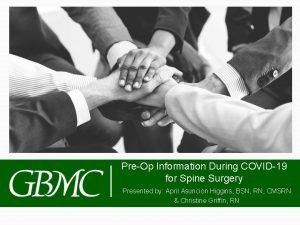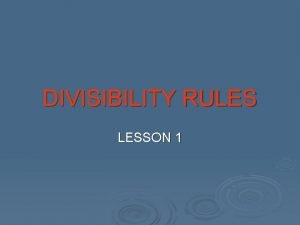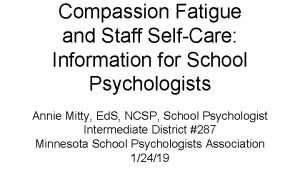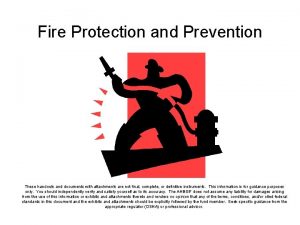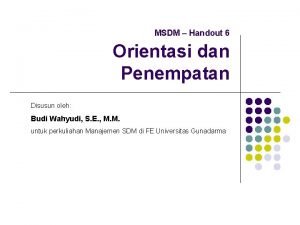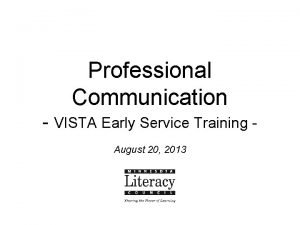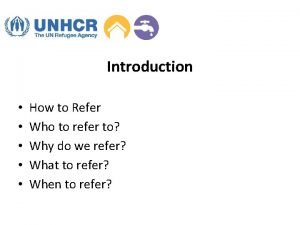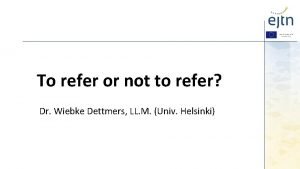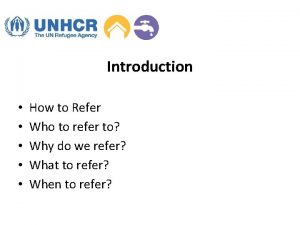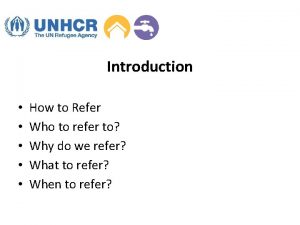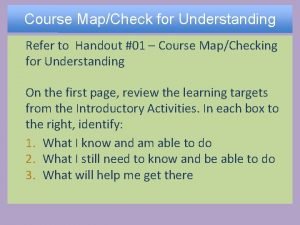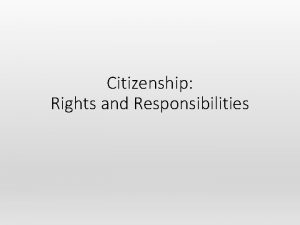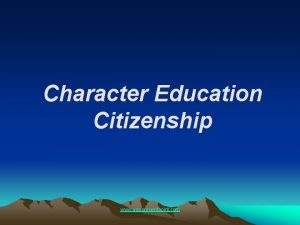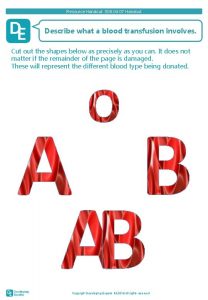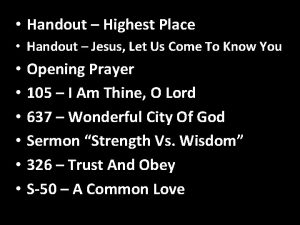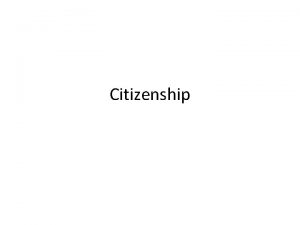Citizenship Refer to your Citizenship HANDOUT Definition of























- Slides: 23

� Citizenship: �Refer to your Citizenship HANDOUT! �Definition of Citizenship a member of a nation or country with full rights and responsibilities under the law. �Three Ways to become a Citizen Born Parents born Naturalization �What two countries are also considered part of the U. S. ? Guam and Puerto Rico

� Aliens = Non citizens � Immigrants = Aliens that plan on moving here permanently � Legal Immigration Act 1990 – gave special consideration and priority to immigrants with special job skills but specifically to relatives of U. S. citizens. � 4 steps of Naturalization � 1. � 2. � 3. � 4. Declaration of Intent Apply Take the test Oath of Allegiance � Before you apply you have to: � Must be 18 years old or older � Have lived in the U. S. for 5 years – OR – serve in the military for 1 year � Need to study basic English, history and civics.

Rights – things you are ALLOWED to do � Responsibilities – thing you are EXPECTED to do � � Personal – pertain to yourself with little of no government implications Speech, Religion, Obey the laws � Political – usually have some government related repercussion � Petition, vote, Jury duty Civic Virtue – a moral habit; helps maintain order and peace in those times that the government is giving you freedom � Self-Restraint � Civic Knowledge � Self-Assertion � Self-Reliance

� Citizenship Means? � Situations that still make you a US Citizen � Naturalization � Aliens v. Immigrants � Legal Immigration Revision Act � How can you lose your Citizenship? � “My right to swing” ends when? � Limited Government � Civic Virtue: Why is it important? What are the categories? � Levels of Citizenship

� Bill of Rights – the first 10 amendments in the U. S. Constitution; grants citizens rights. � 1. � 2. � 3. � 4. � 5. � 6. � 7. � 8. � 9. � 10.

� ANSWERS: � 1. Freedom of Speech, Religion, Petition, Assembly and Press � 2. Right to bear arms � 3. No quartering troops � 4. Freedom from UNREASONABLE search and seizure; Privacy � 5. Rights of the accused � no double jeopardy � Cannot be compelled to be a witness against himself � No private property can be taken without compensation � 6. Right to a Speedy Trial � 7. Right to a Jury Trial – any controversy over $20 � 8. No Cruel and Unusual Punishments or excessive bail � 9. Unenumerated rights � 10. Rights reserved to the States

� � Cruel and unusual…. Or is it!? A judge sentences a person to death for committing a murder. A state law does not allow the judge to consider any special or individual circumstances when deciding whether to give the prisoner the death penalty. � Is the state law cruel and unusual? Why or why not? � If the person getting accused is 17, is it cruel and unusual for him to get tried like an adult and be given the death penalty? Use information from the Power. Point presentation we did in class to justify your answer. Compelled or not…? A drug addict is arrested for robbery and murder. After being in police custody for several hours, he begins to have severe withdrawal symptoms. The police call a doctor who gives him the necessary medication. Nobody knows that this particular medication has the effect of a “truth serum” on the prisoner. The police proceed with the questioning process and within a short time, the prisoner confesses to the crime. � � Was the prisoner compelled to be a witness against himself? Why or why not? What amendment to this situation address?

� Cruel and unusual…. Or is it!? A judge sentences a person to death for committing a murder. A state law does not allow the judge to consider any special or individual circumstances when deciding whether to give the prisoner the death penalty. � Is the state law cruel and unusual? Why or why not? YES IT IS CRUEL! Especially when the punishment at stake is so high, judges need to consider special, and possibly psychological, circumstances that might have affected the crime. � If the person getting accused is 17, is it cruel and unusual for him to get tried like an adult and be given the death penalty? Use information from the Power. Point presentation we did in class to justify your answer. YES IT IS CRUEL! Even though he is almost an adult, he is still underage and the proper punishment should be fit for a minor. Teenagers are less disciplined and more vulnerable to peer pressure than adults. � Compelled or not…? A drug addict is arrested for robbery and murder. After being in police custody for several hours, he begins to have severe withdrawal symptoms. The police call a doctor who gives him the necessary medication. Nobody knows that this particular medication has the effect of a “truth serum” on the prisoner. The police proceed with the questioning process and within a short time, the prisoner confesses to the crime. � Was the prisoner compelled to be a witness against himself? Why or why not? YES HE WAS COMPELLED! He was compelled by the medicine even though it was unintentional, he could not practice his free will! � What amendment to this situation address? 5 – Rights of the Accused

� Other know! � 13. � 14. � 15. � 19. � 26. important amendments you need to

� ANSWERS - Other important amendments you need to know! � 13. Abolished Slavery � 14. Equal Protection Under the Law and Citizenship – all persons born in the U. S. or Naturalized � 15. Right to Vote (Suffrage) Regardless of Race or Color � 19. Right to Vote (Suffrage) for Women – regardless of gender � 26. Established the voting age to be 18 years old – “Old enough to fight, old enough to vote”

This is a list of the Vocabulary you were tested on in your first test! Make sure you have them in your vocabulary section! � � � � � Citizenship – to be a member of a nation or country and to have full rights and responsibilities under the law Naturalization – the process that allows immigrants to become citizens Allegiance – loyalty to a person, country, or belief Bill of Rights – first 10 amendments in the Constitution, added in 1791 Amendment – formal change to the Constitution Aliens – Non citizens Immigrants – come with the intention to stay Legal Immigration Act – Passed in 1990; increased number of immigrants allowed in the United States with special consideration for job skills, or potential for investment. Also, gave priority to family members of US citizens. Rights – things that you are allowed to do because of nature or because of law Responsibilities - The expectation that you will take care of certain things or perform duties

� � � � Limited government – government leaves people when it comes to certain things such as personal matters Civic virtue – refers to the moral habits that are required for the common good of the community particularly within a limited government Common good – general good of the people Patriotism – devotion and pride for ones country Civic Knowledge – knowledge of the rules and limitations set by the Constitution and the government Self-restraint – Self control Self-assertion – standing up for your rights Self-reliance – not depending on others for your basic needs. Bear – to hold or carry Quarter – to house Seizure – to take Compensation – usually monies awarded in exchange for something Impartial – takes no sides; fair Unenumerated – not explicitly stated Abolished – ending or getting rid of Suffrage – right to vote

� From the 1600 s – English traditions of limited and representative government � Monarchy – King or Queen � Relatives and noble families had power and were given land in exchange for loyalty, taxes, etc. � Magna Carta – 1215 King John treated nobles harshly � Rebelled and forced king to sign the Magna Carta protecting their privileges and authority � Granted certain rights such as equal treatment under the law and trial by one’s peers (WHAT AMENDMENTS DOES THAT SOUND LIKE? ) � First form of limiting government � Parliament – England’s law making body – legislature � Common law – no written laws, judges determining right from wrong would look at precedents – ruling in earlier cases � 1600 -1700 s England established colonies in America. � Colony-group of people in one place who are ruled by a parent country elsewhere � Set up through Charter- written document granting land authority to set up colonial governments � First permanent settlement was Jamestown in Virginia in 1607 � Colonists chose 2 representatives and 22 of the governors council – House of burgesses. � Little power but FIRST form of self governance. � 1620 – Pilgrims arrived in Plymouth in Massachusetts � Came in the Mayflower so their compact (Agreement among the people to govern) was called the Mayflower Compact – 1620 � Set up a direct democracy � 1733 - all of the 13 colonies established

� 1760 – King George III took the throne and established a system called mercantilism (selling more than you buy) to try to make as much money from the colonies as possible using the colonies as a source for cheap and raw materials. � “No taxation without representation” – Colonists were upset because they had no representatives in English Parliament � Led to a boycott – refuse to buy English products. � Stamp Act: Tax on legal documents � Tea Act – made tea from Britain the cheapest – British East India Company � � Colonists blocked the ships from the colonial ports, dressed as Native Americans and dumped 342 chests of tea into the ocean = BOSTON TEA PARTY English response = Intolerable Acts AKA Coercive Acts restricting colonists rights and allowing soldiers to search and move into colonists homes

� 1774 – FIRST CONTINENTAL CONGRESS � Colonists sent 12 delegates (Representatives) to Philadelphia to discuss their concerns. They wanted to establish a sort of government in America to stand up to Britain � Sent a document complaining to King George III and demanding to get their rights back � King George III responded violently � May 1775 – SECOND CONTINENTAL CONGRESS Some people didn’t think Colonists could win a battle against Britain. Debated long for the best option. During this time Thomas Paine came out with the “Common Sense” Pamphlet where he argued breaking from England was common sense. � Second Continental Congress = First form of Government in the Colonies � � Thomas Jefferson wrote the Declaration of independence saying the English Crown was not looking out for the colonists’ best interests. In it they say the purpose of government is to protect the rights of the people and that they had the right to overthrow the government for not doing so. � Influenced by John Locke’s “Second Treatise of Government” - It said that a good government is based on a social contract where people agree to give up some of their rights to establish a government and they can overthrow it if it misuses its power.

� Confederation: group of individuals united together for a purpose � � Articles of Confederation Good States kept power and independence = sovereign � No government telling states what to do � Congress can create military to protect the states � � Bad No way to enforce laws � States could ignore laws � No power to colle. Could only be changed with consent from ALL states � ct taxes to pay government funded occupations � � � Limited government? NO! absolutely no government, every man for himself mentality Branches of government? No branches but clearly needed some Citizens rights? No, not defined in Articles All or nothing? Not effective method for altering Articles

� The Virginia Plan: � Established our 3 branches of government � two houses and each state would be represented populations. � The New Jersey Plan: � One � house with equal representation The Great Compromise/Connecticut Compromise � 2 � based on Houses: the Senate and the House of Representative The Senate would have 2 members per state which meant all states had an equal representation The House of Representatives would represent their states based on population. The Three-Fifths Compromise: every 5 ensalved persons would count as 3 free persons. � This way, slaves would count toward the population total to gain more representation in the House for the southern states.

� Constitution was drafted to implement a Federalism �a form of government in which power is divided between the federal, or national, government and the states. � Federalists: supported the document � Anti-federalists: felt it gave too much power to the national government; wanted a bill of rights. �The promise of a bill of rights turned the tide and Anti-federalists agreed to the proposed Constitution � Needed 9/13 states approval – In 1788, New Hampshire was the 9 th State

� Limited government? � Magna Carta? � Federalism? � Anti-Federalists? � Colonies: First and second settlements? � Intolerable acts? � “Common Sense” � First and Second Continental Congress? � Virginia Plan? � New Jersey Plan? � Connecticut Compromise? � 3/5 Compromise? � “No taxation without representation”

� Article I: Legislative Branch Composed of the Senate and House � Requirements: � House of Reps: 2 year terms 25 years old 7 years citizens Senate: 6 year terms 30 years old 9 years citizens All bills regarding money start in the House of Representatives � Legislative Powers = taxing, Naturalization, Money related bills, Postal Service � � Article II: Executive Branch Composed of the President, VP and Cabinet Members � Requirements: � Serve 4 year terms Must be 35 years old Natural Born Citizen Live in US for 14 years Elected by the Electoral College NOT directly � In charge of the Military and Cabinet � Can be removed through impeachment for treason, bribery, misdemeanors, or high crimes. �

�Article III: Judicial Branch �Composed of the Supreme Court �Federal Judges are appointed by the President �Serves as the referee between the branches and can overturn laws it deems unconstitutional. �Article States �State IV: Relations between the problems should be addressed by the state governments �States must treat citizens of other states as if they were citizens of that state. �Explains how new states are accepted into the U. S.

�Article V: Amendment Process �Explains �Article how to amend the Constitution. VI: National Supremacy �“Supreme Law of the Land” �The laws in the Constitution are above all government; everyone must follow it �Article VII: Ratification �Approval of the Constitution �Explains Constitution will be in effect after 9 out of the 13 States ratify it.

This vocabulary should be a review of the whole year! Study them because I will chose words from this list for your test! � � � � � Citizenship Naturalization Bill of Rights Limited government Civic knowledge Unenumerated Suffrage Amendment Appropriations Boycott Cabinet Colony Confederation Direct democracy Representative democracy Duty Federalism � � � � Immigrant Impeachment Indictment Judicial review Legislature Mercantilism Parliament Preamble President pro-tempore Ratify/ratification Resolution Revenue Separation of powers Tribunal Treason veto
 Handout definition
Handout definition Rolling with resistance example
Rolling with resistance example Spinal precautions
Spinal precautions How does a plant resist disease and pests journey 2050
How does a plant resist disease and pests journey 2050 Ciri-ciri handout
Ciri-ciri handout Handout gestalten schule
Handout gestalten schule Nectar consistency is cna
Nectar consistency is cna Divisibility rules lesson
Divisibility rules lesson Ted talk compassion fatigue
Ted talk compassion fatigue Handout
Handout Lecture handout
Lecture handout Wound healing nutrition handout
Wound healing nutrition handout A hip a hop a hippity hop
A hip a hop a hippity hop Fire extinguisher training handout
Fire extinguisher training handout Wise mind handout
Wise mind handout Odysseus hades
Odysseus hades Point of choice
Point of choice Which nutrient practice was best journey 2050
Which nutrient practice was best journey 2050 Pengertian orientasi
Pengertian orientasi Contoh handout pai
Contoh handout pai Printable lsvt loud exercises handout
Printable lsvt loud exercises handout Johari window handout
Johari window handout O in fat tom
O in fat tom Emotion coaching handout
Emotion coaching handout


